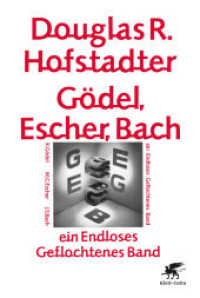- ホーム
- > 洋書
- > 英文書
- > History / World
Full Description
The Correspondence of Elizabeth Stuart is the first complete edition of the letters of Elizabeth Stuart (1596-1662), Electress Palatine of the Rhine and Queen of Bohemia, daughter of King James I of England and Anna of Denmark.
Volume I covers Elizabeth's life as princess and consort in the years between 1603 and 1631. It includes letters exchanged with her brother, Henry Frederick, the courtship letters of Frederick V, Elector Palatine, and Elizabeth's experiences of both marital and court life in Heidelberg, especially her struggle with Germanic culture and her arguments with both her husband and mother-in-law over rights of precedence. From 1619 her letters become increasingly political as she begs her father, the Duke of Buckingham, and others for assistance in the desperate struggle for the Crown of Bohemia. Deposed in 1620, Elizabeth spends her time in exile devising ploys to gain further financial, moral, and military support from statesmen and military leaders such as Sir Dudley Carleton, the 'Mad Halberstadter' Christian of Brunswick, Count Ernest of Mansfeld, King Christian IV of Denmark, and Bethlen Gabor, Prince of Transylvania, behaviour increasingly in defiance of her father's wishes and demands.
Elizabeth's letters evidence her slow transformation from political ingenue to independent stateswoman, a position cemented as her husband fell victim to the war they had precipitated. The diplomatic writing skills she developed in this period were to become her only weapon for securing both the inheritance of her many children and her own position as a key religious, political, and cultural figure in early-modern Europe.
Contents
Preface and Acknowledgements ; List of Illustrations ; Abbreviations ; A Note on Editorial Principles ; A Note on Dates ; Introduction ; The Letters ; Appendix: Cipher Keys ; Bibliography ; Index








